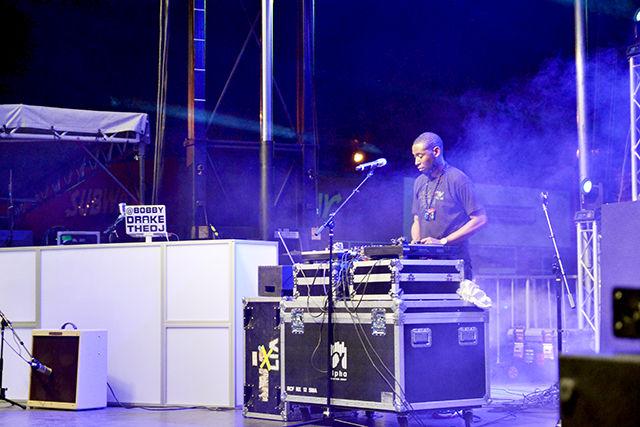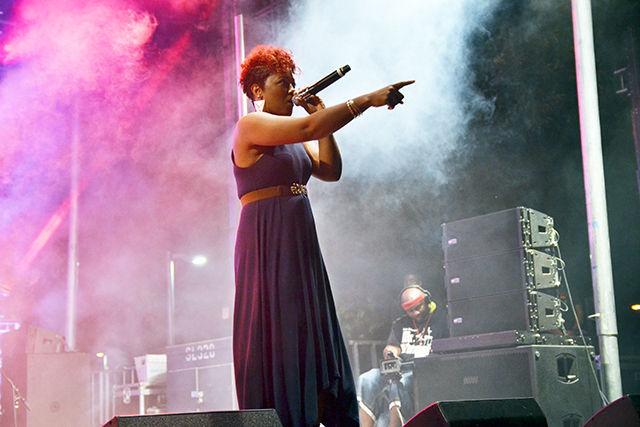After their sets for Packapalooza on Saturday, Rapsody and 9th Wonder spent some time talking about what inspires them, how they got their start and what making music means to them.
Rapsody
Q: First of all, I’d like to say thank you so much for coming and performing. You were amazing.
A: I’m glad to be here. This is my alma mater so to come here … This is where I started rapping. Me and four friends, we started a hip-hop organization here, and that’s how I got into it. It was called H2O, the hip-hop organization. It was a crew of about 20, but the four or five of us were together more than any, and we became Kooley High. All of us come from here. So this is … man, I come here and walk all the time, and we just talk about memories.
Q: Have you ever heard of the group Cypher? They do hip-hop here.
A: Yeah! They meet on Monday nights. I’ve been there a few times, myself.
Q: You took a moment on stage to talk about being a female rapper and how you’d rather not be thought of that way. Can you tell me a little bit about why you did that?
A: I think, before when I first got into it, being a female rapper, I had a little pride with it. We’re underrepresented, so representing females felt good. But it wasn’t until I got into the business that I saw how much it separated us. It put us in this box where we’re not able to compete with the guys. That we’re not seen as competition or that we have an equal skill set, and for that reason I had to drop that term because I can rap just as good and even better than a lot of guys, and so I just call myself an emcee right now. I get a lot of comments like, “oh, you’re good for a female” or I’m in your top 10 females, but I want to know where I’m at in your list of artists. That’s why I turned away from the term.
Q: You mentioned that you wouldn’t be where you are today if it weren’t for some of the female emcees that came before you. Would you say that they inspired you? Is there anyone in particular?
A: Most definitely. There are more that stand out than others, but you can find inspiration in any female doing it. But MC Lyte was the reason I wanted to rhyme or that I knew I could rhyme. She was the first female I saw doing it on TV and doing it well. So MC Lyte, I like Foxy Brown and Lil’ Kim, but Lauryn Hill probably had the biggest impact. Outside of just her skill as an artist, she’s in a group with two other guys, and she’s the best rapper. With “The Miseducation” [Lauryn Hill’s album] I loved her honesty. You hear a lot of guys say that they can’t relate to a female, but Jay-Z and these other artists rode around and listened to “The Miseducation,” and that’s what I loved. She talked to women and men, and she just talked about life.
Q: You have a very strong storytelling vibe to the rhymes you use. Is that where they come from? You being inspired by Lauryn Hill?
A: Oh, absolutely. But also Jay-Z and Common and Mos Def. I draw inspiration from a lot of artists. Even older artists like Luther Vandross and Michael Jackson. My parents, Saturday mornings when we were cleaning up, that’s what we would listen to. I draw inspiration from everywhere, even movies. I’m a really big movie-head, so they inspire me.
Q: With your rhyme schemes and storytelling in your music, do you ever pull from personal experiences?
A: Oh, definitely. I think a majority of my music is from personal experiences. I think sometimes it takes people who aren’t used to decoding lyrics to understand, but whether it’s something I lived, or something I saw, or a conversation with a friend or even, sometimes, just watching TV and what’s going on in the world, I try to touch on it in my music. That’s what hip-hop is to me. It’s the voice of the people. It’s our stories when other places like CNN don’t tell our stories — our truths.
Q: You mentioned Mike Brown in your performance. What was it like to see everyone raise a hand for him when you asked them to?
A: When I say that, and everybody does put their hands up, that lets me know that they get it, and they are aware. It is beautiful. It’s something that we all need to come together to fit and move past those things, so it’s just beautiful.
Q: Are you happy with how things have turned out for you and your career?
A: Oh, yes. Definitely feeling-wise. Growing up and not knowing the business and how it is, you always see it going totally different from how it actually goes. I don’t think I would have rather done it any other way. Singing to 9th Wonder and having my team around me — having people that really care about you as an artist not you as a product or you as a number. Where it’s not about how much money you make, but who you are as an artist and the craft you make. To go this path, to go the marathon and not the sprint, that’s the way to do it.
9th Wonder
Q: Where does your inspiration come from? You’re known for your soulful, old-school beats, and I was just wondering if that comes from anywhere.
A: Probably from my family, man. My mom and my dad are 33 and 34 years older than me, and their sisters and [their] brothers are around the same age, so I grew up around old souls, you know. I kinda got it from that. Listening to music and just sitting around and I never kinda left that. It’s just hard not to have a soulful spirit living in North Carolina, anyway. Once I got into hip-hop I understood that some of my favorite producers were using soul records to make samples and make beats and things.
Q: What you do is beautiful. Very few artists seem to be able to make beats as quickly and skillfully as you do.
A: It’s a spiritual. It’s a trance almost. When you make beats and you hit that sweet spot, it’s definitely a trance. There’s definitely a spiritual essence to it. There’s nobody but you and the beat machine and nobody around you that can interfere with it. It’s definitely a spiritual trance-like … once you’re sitting there, it’s just an experience.
Q: I know you became a Harvard fellow a few years ago. How has that been to be able to teach the next generation about this kind of music?
A: I’ve been teaching for about nine years now. I started at North Carolina Central, then I went to Duke and then Harvard. Now I’m back at Central, and in the spring I’ll be starting at the University of Pennsylvania, and that will be my second Ivy League school. That’s definitely a whole different kind of experience. Outside of my music, I don’t really get to interact with 18, 19, 20 or 21-year-olds, and me being my age I get a way to feel exactly where you guys are coming from. Not through Facebook or anything, but just engagement with each other. That’s probably the best thing I get from it. They learn from me, but I also learn something from them. I love it.
Q: Are you able to use what you’ve learned from your students with the music you create and the things that you do?
A: The biggest piece I use when I teach my class is my life experience. A lot of students graduate from college without any life experience, and when they graduate things don’t go the way they planned. They think, “Well, it’s not supposed to go this way,” so I kinda give them advice on that. Life experience. I went here. I went to NC State. I lived in North Hall. I lived in Avent Ferry. I lived in Metcalf in the summer. I lived in Tucker. I can name every dorm on campus. It’s really the life experience that I put into my teaching.
Q: Those life experiences you mentioned, are they in the music and beats you create as well?
A: Yes, exactly. Even with that. I know it sounds cliche going for your goals and dreams, but that’s exactly what I did. I made my first beat on this campus in North Hall, which is right down the street. I was flat broke, but I found comfort in the music and went from there. I went from house to house, floor to floor and sofa to sofa, and it paid off.
Q: How does it feel to know you made your first beat in North Hall and be here today performing?
A: Very crazy. It’s weird. I lived in North Hall. We used to walk to the IHOP. You know, it’s all weird. The Bell Tower goes off every 30 minutes. It sings the fight song as 12 [midnight]. You know, all of this stuff … going to eat at the Atrium, going to eat Chick-fil-a and D.H. Hill and the Wolfline. Everything about NC State, I remember being here. I just know looking out into the crowd those students are going through the exact same thing. Walking across the Brickyard when it’s cold out, getting lost in Harrelson [Hall]. Just everything…I’ve been a part of that. I just hope that they can see me and say, “Hey man, he went to school here. Rapsody went to school here. If I really want to do it, I can do it because they did.” Like I said, I know that sounds cliche, but that’s what it is. Enjoy your college experience; you’re never going to get it back unless you decide to get your masters or your Ph.D. Once you leave NC State, it’s kind of hard to come back. You’ll always reminisce about this place. I love this place. I walk through campus all the time. Some kids know who I am; some kids don’t. I always ride through here down Hillsborough Street and reminisce. I miss this place a lot.
• Born in Wilson, North Carolina, on Jan. 21, 1988
• Began her career as a member of the NC based hip-hop group, Kooley High
• She is an emcee
• Launched her solo career in 2008 after signing with 9th Wonder’s It’s A Wonderful World Music Group
• Known for her intricate rhyme patterns and wordplay
• Her latest EP is called “Beauty and the Beast”
• Born in Winston-Salem, North Carolina, on Jan. 15, 1975
• He is a hip-hop record producer, record executive, DJ, lecturer and rapper
• Began his career as the main producer for the group Little Brother
• He has worked with Mary J. Blige, Kendrick Lamar, Ludacris, Jay-Z, Drake, Destiny’s Child and more
• Known for his smooth and soulful production style
Rapsody pumps up the Packapalooza crowd on Saturday, Aug. 22, 2015. Packapalooza was an all day event held on Hillsborough Street.









